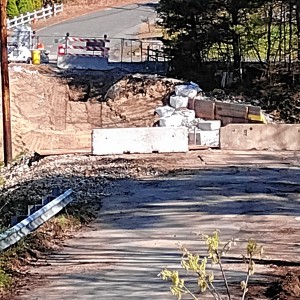McGovern farm tour assesses need across the valley
| Published: 08-23-2023 4:30 PM |
COLRAIN — With a federal farm bill on the horizon, U.S. Rep. Jim McGovern set out on his 13th annual farm tour Tuesday to get a sense of what Franklin and Hampshire county farmers need to continue bringing food to tables across the state.
Following a spring frost that killed peaches around the region and July’s rainstorms that washed away crops prepared for harvest, McGovern stopped by several farms in the valley and stressed the importance of providing farmers with the resources they need to provide food.
“Sometimes the government programs are like a puzzle and they don’t all fit together and we’re not helping farmers as much as we need to,” McGovern, D-Worcester, said. “Agriculture’s an important part of our economy here in Massachusetts. This is about getting access to good, locally-grown food, I think it’s a food safety issue.”
The farm bill is a piece of federal legislation that is renewed each year and includes funding for the Supplemental Nutrition Assistance Program (SNAP); Women, Infants and Children (WIC) program; school lunches and other programs that address hunger. McGovern is a key figure in developing the bill and has been a champion on addressing hunger across the United States, with Monte’s March serving as the major local event each year.
At Pine Hill Orchard in Colrain, Brady and Matt Shearer, who operate the farm with Matt’s father, Dave Shearer, gave a tour of the rows of apple and peach trees and shared the challenges they’ve faced this year.
“On a normal year, we would probably pick about 40,000 to 45,000 bushels of apples. This year … we’re going to be picking more like 15,000 bushels of apples, so it’s a huge loss in crop there,” Brady Shearer said, adding there is “not a peach on the farm” due to the frost. “It’s definitely been a totally different year we’re going at here. We’re really banking on having a really good pick-your-own season and keeping our retail business going up.”
Walking through the orchard, the Shearers showed examples of fire blight — a bacterial disease that can destroy apple orchards and thrives in the wet, warm weather the region experienced this year — and frost rings, which form around the center of apples when they freeze while blooming.
If the disease or frost don’t outright kill the apples, the frost ring stops people from picking them due to the appearance of a brown ring wrapping around the fruit. Brady Shearer said it sometimes gets to the point where people won’t even buy apple pies or other goods made with frost ring apples, even though the fruit itself is perfectly fine to eat.
Article continues after...
Yesterday's Most Read Articles
 Sportsman’s Corner: The quest for the Super Slam
Sportsman’s Corner: The quest for the Super Slam
 Cryptozoology exhibits featured at Education Earth Museum
Cryptozoology exhibits featured at Education Earth Museum
 Athol Police Logs: April 12 to April 19, 2024
Athol Police Logs: April 12 to April 19, 2024
 Athol Royalston Middle School Honor Roll Term 3
Athol Royalston Middle School Honor Roll Term 3
 Work on Pinedale Avenue Bridge connecting Athol and Orange to resume
Work on Pinedale Avenue Bridge connecting Athol and Orange to resume
 Longtime public servant Richard Sheridan dies at 78
Longtime public servant Richard Sheridan dies at 78
Other stops in Franklin County included Natural Roots Farm in Conway, which was devastated by the South River’s floodwaters in July, as well as Our Family Farm in Leyden and Fern Hill Farm in Buckland. Earlier Tuesday morning, McGovern’s tour started at Mayval Farm Creamery in Westhampton and Flat Rock Farm in Chesterfield.
With around 100 registered dairy cows, Mayval is one of only 120 remaining dairy farms in western Massachusetts, compared to over 22,000 a century ago.
The decline in small dairy farms is a testament to the difficulties faced by the small dairy farm industry, as larger agricultural operations produce more dairy products at lower costs, and as plant-based options take the place of milk for many consumers.
“We’ve got to figure out a way to help our dairy farmers not just survive, but thrive,” said McGovern. “For food safety, for the local economy, for protecting the environment.”
This year, the federal government is expected to pass a new Farm Bill, a legislation package that has been revised and renewed once every five years since the 1930s, when it was first introduced as part of President Franklin D. Roosevelt’s New Deal.
The Farm Bill provides support for a range of programs including crop insurance, healthy food access, SNAP, school lunch, farmer trainings and more. As senior member of the House Agriculture Committee, McGovern is a key figure in shaping the bill.
“It’s so incredible that our elected official representing us in D.C. has that kind of prowess and foresight,” said Philip Korman, executive director of the Community Involved in Sustaining Agriculture (CISA), an organization represented at Tuesday’s tour along with other western Massachusetts farmers and advocates.
CISA — with the mission of strengthening local farms and engaging the community to build a resilient local food system — works with McGovern on planning for his annual farm tours, helping him visit farms that touch on relevant themes.
“Farms have the opportunity to meet with folks who work for different state and federal agencies, and be able to say, ‘here’s my challenge point. What can your government do with us and for us?’” Korman said.
In surveying these farms, McGovern said folks need the support, especially because many agricultural businesses in the Pioneer Valley are family-run operations that can’t absorb the same impacts industrial-sized farms in the Midwest or other regions can.
“Under the best of circumstances … they’re just making a little bit of profit at the end of the year,” McGovern said. “We have to figure out a way in the short term to provide them support and that’s what we’re trying to do on the federal, state and also within the private sector.”
“While I also think we’ll get through this immediate crisis, we also have to be thinking about long-term solutions,” he continued. “What infrastructure improvements need to be made, so that if we have similar situations in the future, the impacts are not so adverse.”
Chris Larabee can be reached at clarabee@recorder.com or 413-930-4081. Staff Writer Maddie Fabian contributed to this report.

 UMass student group declares no confidence in chancellor
UMass student group declares no confidence in chancellor State Senate budget funds free community college for all
State Senate budget funds free community college for all